If you’re evaluating online store builders, you’ll likely find a dozen options, all claiming to be the best for business owners. But which ecommerce builders are really worth their weight? And how do you choose one when starting your ecommerce business?
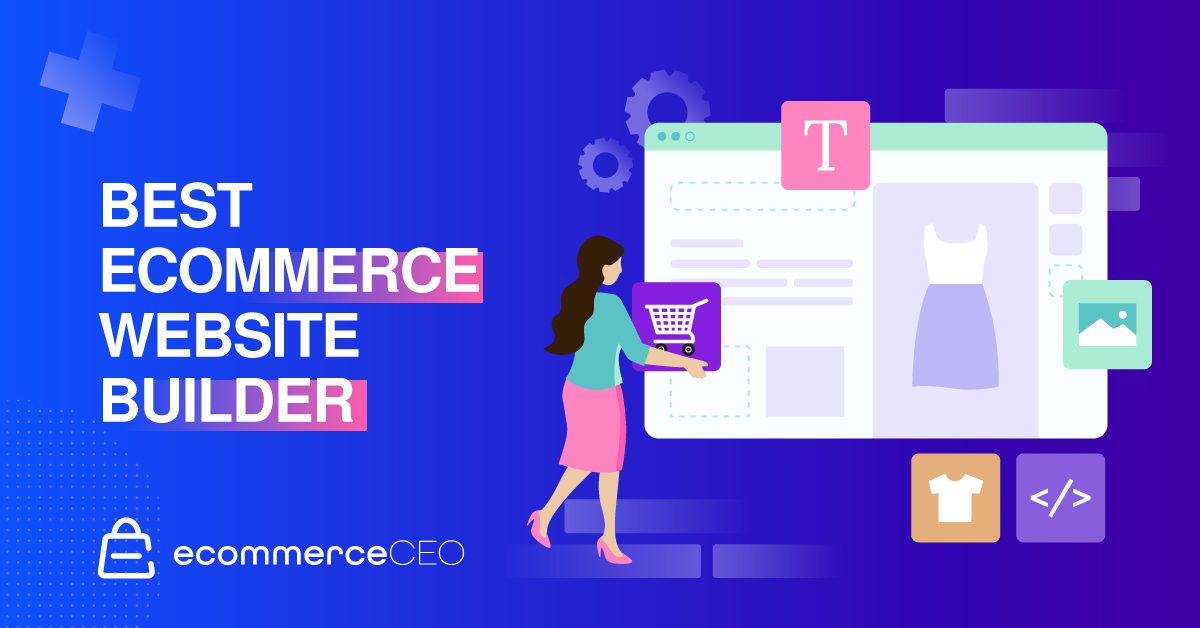
In this article, we’re reviewing the best ecommerce website builders for entrepreneurs. We’ll break down popular choices for your online store (from free options and low-cost plans to premium plans with built-in ecommerce tools) and guide you in evaluating what features make the most sense for your business. And how to get started quickly!
7 Best Ecommerce Website Builders
Which Ecommerce Website Builder is Best for You?
Before we jump in, let’s look at some of the elements an ecommerce website builder provides that are essential for any ecommerce site. Understanding why these basic commerce features matter can help you be in a better position to create an online presence and set your store up successfully!
High Quality & Easy to Use
Let’s start by saying that if you choose one of the more popular website builders, you will have access to enough tools to build a successful web store. But high quality and easy-to-use don’t always go hand in hand, which is why builder reviews can be helpful for business owners when getting started.
A high-quality ecommerce website allows you to build a solid design, sell products online, payment processing (from sources like Apple pay, Google pay, and credit cards and debit cards), and offer social media integrations.
Social media integration and multichannel sales mean that products can be easily linked and featured on platforms like Instagram and Facebook. This cross-posting allows better brand (and product) exposure across different mediums from one central location. This means you can skip a rigorous setup process on each where products need to be loaded again.
Outside of small or outdated ecommerce platforms, these essential features shouldn’t be hard to find from a quality ecommerce site builder.
The key is identifying the platform that makes these features easy for you as the business manager while remaining simple for website visitors – and balancing both with your site builder investment.
You may not find advanced ecommerce features like integrated inventory management, a seamless payment processor (not to be confused with payment gateways) with automated sales tax, and abandoned cart recovery from a free online store builder. Still, when building your online store, they’re integral ecommerce tools (and may be worth paying for, depending on your needs).
Look for a high-quality platform to present your online business in the best light, but don’t sacrifice ease of use. Whether you plan to use a design agency to build your website and start selling online or try to DIY, understanding the platform, what it offers, and being able to use it are the top priorities.
Quality and Variety of Templates
Your online store shouldn’t look like everyone else’s, which can happen if you choose a website builder with limited options. Look for quality templates and advanced design features that don’t look boring or basic.
Why care about variety and the quality of ecommerce templates? Building your brand means showcasing what makes you unique and stand out in the marketplace.
If you’re new to an ecommerce site builder, drag-and-drop options from a template gallery simply mean that you can add and move design sections and elements without having to know how to write complex code.
A variety of beautiful templates mean you’ll be able to select one that properly represents your brand – and isn’t so basic that it’s immediately recognizable from the platform. If you select a builder with limited template options, the store you build will look similar to others in your space, leaving little ability to build brand identity, customer trust, and customer loyalty.
As an example, some stores (like Shopify and Wix) offer hundreds of themes, both free and for purchase. Your online store can be customized and truly tailored to represent your brand with such a wide range of options.
Depth of Customization
When choosing the best ecommerce website builder, customization matters. Your online store is a representation of your brand, so being able to select colors, fonts, and how your images are displayed for your ecommerce website is non-negotiable.
Beyond the basics, the level of customization from your ecommerce website builder can help set your online store apart.
Integrations (from plugins to software connections), and the ability to upload custom design elements, font files, and more are something to expect from any of the best ecommerce website builders.
Think about a basic site with two or three sections that look repetitive and mundane versus a site that features unique elements and design functionalities. Scrolling text, moving icons, parallax movement, and more complex visuals help make your online store unique to your brand and memorable to your customer. And access to features like that depends on the platform you choose.
When selecting your ecommerce website builder, balance the monthly cost (free plans versus paid plans) with the level of sophistication and customization to make your online store stand out. For some, the cheapest plan may make the most sense as long as it’s a scalable platform, and for others, an advanced plan may be required from day one. Find the best fit for you and your business.
Intuitive UI
We’ve covered the additional features that make ecommerce websites personalized and easy to use, but a good (or the best website builder) also takes website design and the user experience into consideration.
Intuitive UI uses web design with a clear menu, navigation, displays, and other elements to make moving through the website – from page to page – a simple process. When new visitors land on the site, overwhelming them with products, images, or too many ways to navigate to the next step is a bad idea. While it may be understandable for software experts, it doesn’t work for your potential customers and can affect loading speeds.
The best online stores don’t require excessive clicks to scroll through unlimited products. Instead, the best ecommerce website builder ensures shopping is easy and intuitive, increasing conversions and the opportunity for repeat sales.
Best Website Builders for Ecommerce
Now that we’ve covered what to look for when building your site, let’s review. Whether you’re selling physical products or gift cards, it’s imperative to start with an option that’s high quality, easy to use, and has a wide range of professional templates that work everything from smaller to larger businesses.
The best way to start building a website is by choosing a platform that’s right for you. There are plenty of free options out there, but if you want something that will grow with your company, I recommend going with one of the paid services. Some of them offer unlimited plans, which means they’ll always be able to handle any traffic spikes. Others let you pay only when you reach certain milestones, like reaching 10,000 visitors per month. And some charge monthly fees regardless of whether you hit those numbers, so it’s worth looking into all your options before making a decision.
You may want to start with a 15-day free trial or basic plan (that’s inexpensive) before moving from the basic plan to something more sophisticated with powerful features and a heftier price tag. Decide what level of customization you need and which platform makes the most sense. While there is no perfect option, choosing the right online store platform for you when getting started will help you grow and scale easily in the future.
Now that we know what to look for let’s dive into how the top ecommerce website builders compete, starting with Shopify.
Shopify
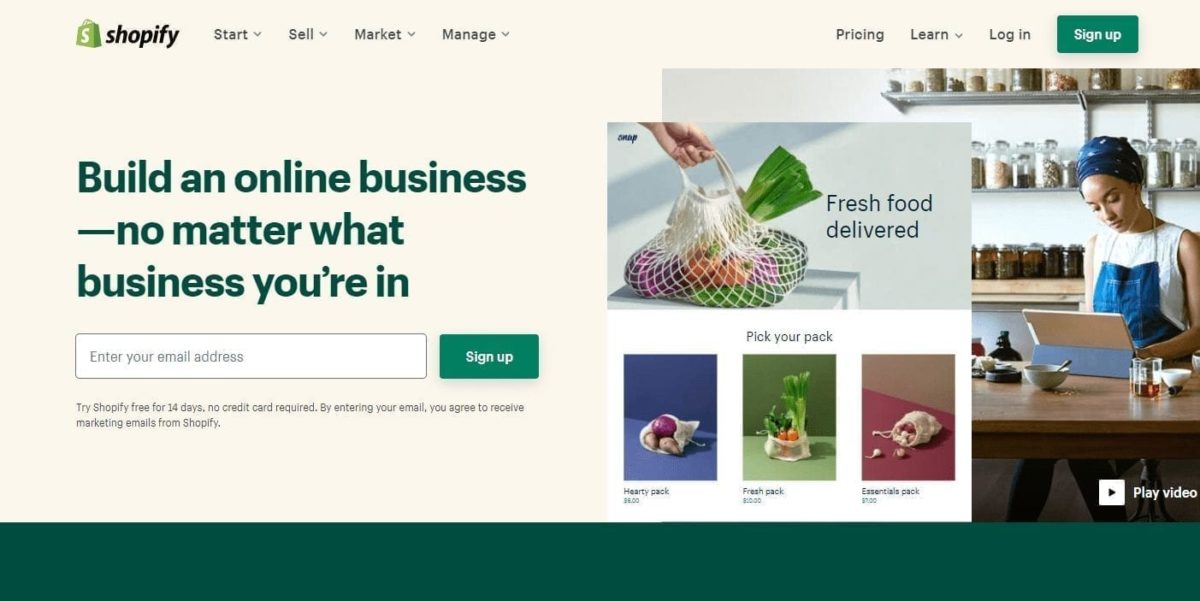
Shopify is one of the most popular website builders in the ecommerce space. That’s because its robust platform was built for ecommerce. This site builder handles everything from web hosting to client messaging seamlessly with minimal hassle and easy-to-use backend order management.
With the Shopify platform, you can easily sell products from your online store through other social platforms (like Facebook and Instagram) with the click of a button. You can also create coupon codes or promo codes for online sales and more. It also has great POS integration for checkouts.
The Shopify platform supports almost any ecommerce business plan, whether you’re a startup or running a large web store. That’s thanks to its pricing plans that go from basic (perfect for a few sales per month) to ShopifyPlus, which supports almost unlimited products and sales with the tools of a sophisticated operation. Shopify’s platform offers great options if you want to go for the dropshipping method.
Another pro in Shopify’s corner is the extensive plugin store that allows small businesses to add what they need to reach potential customers without requiring extensive coding or customization flexibility.
Need an app to limit deliveries by day? There’s an app for that. What about a calendar and booking integration? Shopify has you covered. You can even set up an email marketing tools using Shopify.
However, even with all its bells and whistles, there are downfalls with Shopify. Even with its vast variety of payment method options, you’ll need to be aware of its additional transaction fees.
Shopify is a complex business software and robust ecommerce website builder with an attractive range of templates, user-minded features, and a wide range of apps. And that’s why it’s one of the best sales platforms around.
Wix

Next up in our builder comparisons is Wix. Wix makes the list of best ecommerce website builders for being user-friendly with an easy-to-use drag-and-drop builder that allows you to quickly set up an ecommerce store and be ready to sell online (you’ll even get a free domain name for the first year if you go for the annual plan). It’s known as being a beginner-friendly website builder.
As website builders go, Wix is an intuitive platform with hundreds of customizable templates with design flexibility and even artificial intelligence if you want to use the automated ecommerce store builder. In addition, all Wix websites come with SSL (Secure Sockets Layer) certificates and unlimited bandwidth.
And like Shopify, a Wix ecommerce site provides hosting that has an impressive uptime rate.
In addition, when you build an online store with Wix, you’ll have a dashboard that allows you to manage shipping options, payments, orders, inventories, revenue, and more.
So, what’s lacking? One of the benefits of Wix (easy, simple designs that can be completed easily) can also be a negative in some cases. While the design is easy to execute on Wix, sometimes the simplicity means users miss the complexity required to launch a successful site for search engines. Further, Wix does not come with an integrated POS system.
Looking good to the end user isn’t all that matters, so if you plan to use Wix, be sure to understand how to structure the site and complete your search engine optimization (SEO) data correctly. Otherwise, you may end up with an attractive site that doesn’t gain organic traffic over time.
BigCommerce
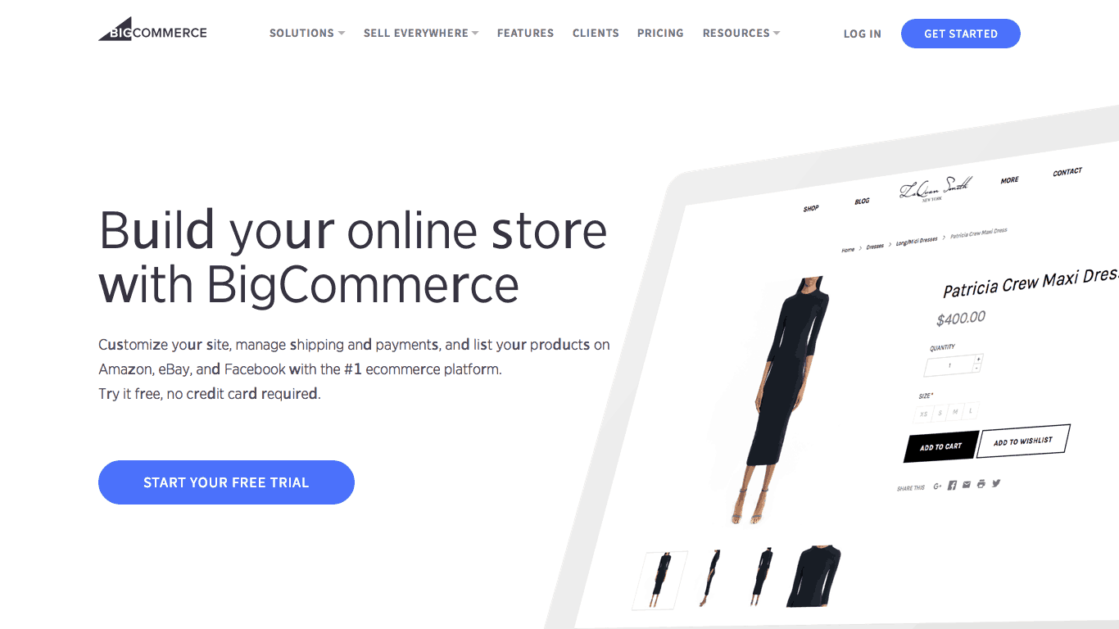
c makes the list of best website builders for its selection of basic features that support B2C and B2B sales.
BigCommerce supports multichannel selling more than other site builders, so utilizing the point-of-sale system is as easy as sharing across Instagram, Google Shopping, eBay, Amazon, and Facebook with your choice of payment providers.
The website builder itself has drag-and-drop functionality, and that makes getting started easy, but the extensive list of advanced features makes fully utilizing this online platform more complex than other basic ecommerce site builders, but giving you more creative control.
BigCommerce offers a free trial, so you can see if it’s right for you. It has an excellent drag-and-drop editor that allows users to build websites quickly without needing any coding knowledge. Templates are available for different industries, including fashion, food, beauty, home improvement, travel, health, sports, and many others.
For this reason, BigCommerce makes the list as a best ecommerce platform but is typically selected by more advanced users who can afford extra costs.
Squarespace
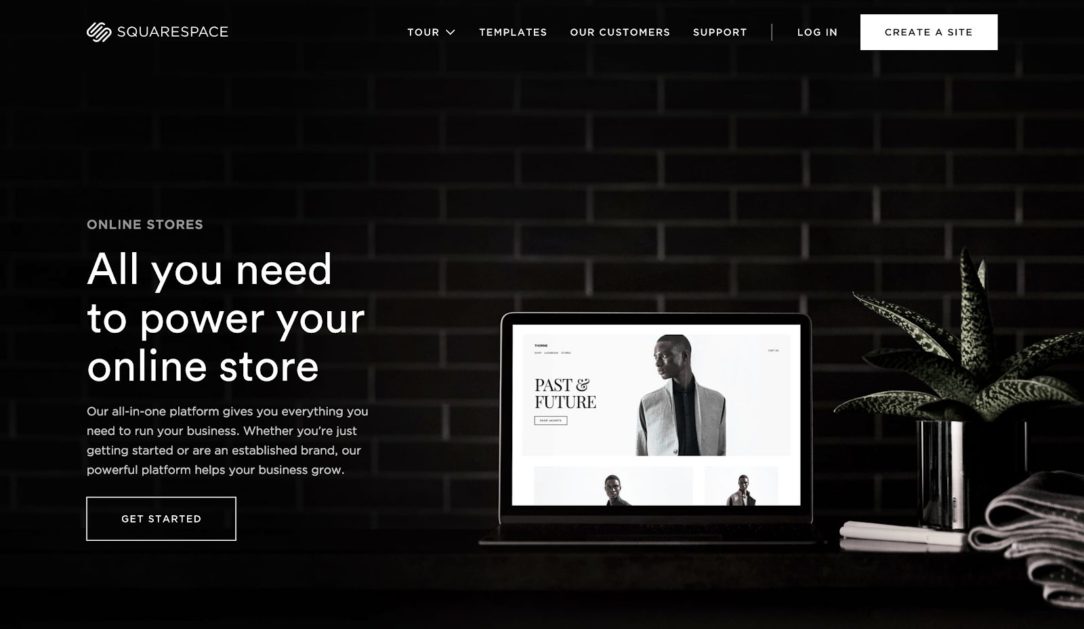
Squarespace is a traditional website builder that integrates ecommerce functionality into its plans. Squarespace boasts award-winning design templates but remains one of the most accessible platforms for non-technical ecommerce owners.
In addition to ease of use, Squarespace has a library of great templates that allow you to customize your site, which is seamlessly responsive for mobile devices.
One of the only downsides you’ll find with Squarespace is the limited menu options for navigation. Traditional menu options work well for average-sized sites, but if you are building something massive and need customized menu options and navigation features, Squarespace may not be for you.
Regarding ecommerce, Squarespace stays competitive on features but also charges zero transaction fees and has no product limits – all while providing exceptional customer support if you get stuck. At $50 or less per month, Squarespace is a solid popular ecommerce option for our top ecommerce website builder list.
WooCommerce
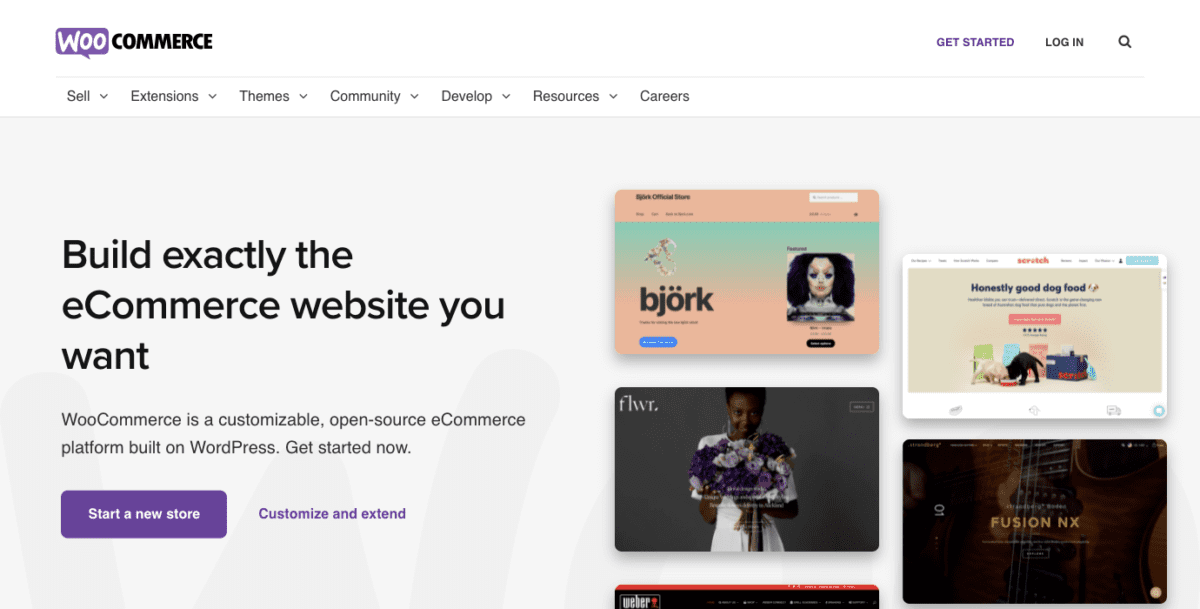
If you have an existing WordPress site (or plan to build on WordPress), then WooCommerce is an awesome add-on that will add ecommerce to your existing website. You can also build directly on WooCommerce (this option still utilizes WordPress).
Both uses tap into the benefits of WooCommerce, including functionality, security, SEO features and tools, and quick speed.
One of the reasons WooCommerce is listed on the “best ecommerce site builder” list is its unique open-source nature. Because of that, it’s free to install and requires no per-month fees.
However, premium options will cost you on WooCommerce, so if you want to utilize specific features, like a shopping cart, you may need to budget for per-month charges.
Either way, plan for transaction fees to process credit and debit cards for purchases. WooCommerce works with many payment processors, including Square online, Stripe, Paypal, Apple Pay, and more.
Ecwid
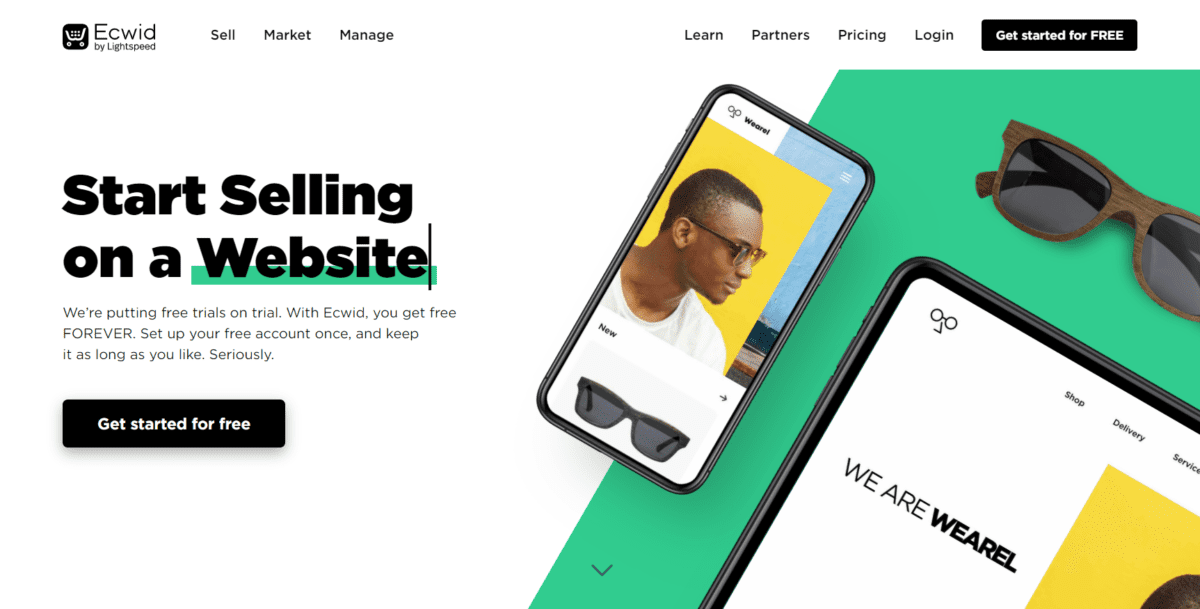
Ecwid is a unique ecommerce builder because it’s not known for the builder as much as its seamless integration. Ecwid was designed as a widget that adds ecommerce functionality to an existing site.
More recently, Ecwid has added options to build a standalone site called Instant Site. Instant Site is included with every Ecwid account and is very intuitive. Some of its benefits are:
- Free to use
- Mobile friendly
- Essential SEO tools
- Fully customizable
No coding knowledge is needed to design your website with Instant Site. Just choose your template, typography, images, and layout to suit your brand’s style.
The upside of Ecwid is its affordability, with a free option that gets you started selling online quickly. Don’t expect much from this free option in the way of built-in features or support, but do use it if your budget per month needs to stay low or you want to upgrade an existing (non-ecommerce) site.
Zyro
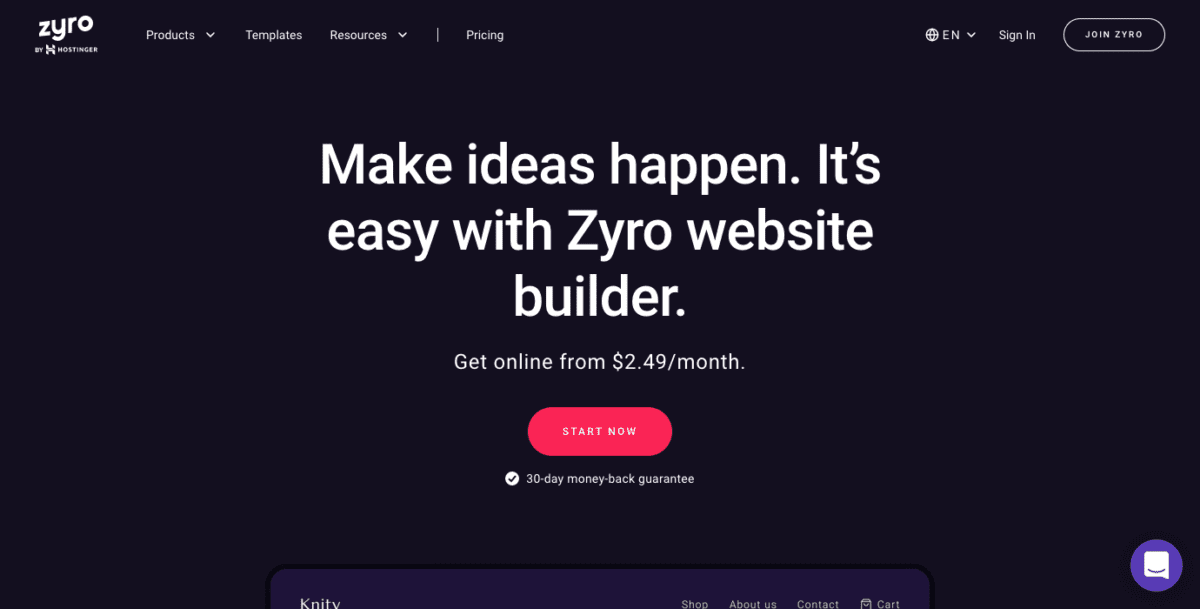
While not the most sophisticated option, Zyro is another platform that competes on price. The cheapest plan on this platform starts at under $5 per month.
Setting up a layout is a breeze thanks to the drag and drop builder, as is customizing a theme. You’ll also find a unique AI component that can help generate content and help you evaluate user actions, the customer journey, and important patterns. Zyro also boasts simple integration with Google Analytics.
Where Zyro loses out is to competitors that offer better customization and more unique drag and drop designs. Consider Zyro only if you’re comfortable with basic design elements.
Selecting the Right Website Builder for Your Business
Ready to get started online and looking for the best ecommerce website builder? We can help.
Our list of platforms features the best of the best. Even still, some of these top website builders offer more options you may need while others compete strictly on price. Understand the basics of what you need for your store (customization options, intelligent navigation, etc.), compare options, costs per month, and ease of use, then jump in and build your store!
Frequently Asked Questions
Have questions about our list of website builders or getting started in ecommerce? If you still have questions, we’ve compiled a list that will help you get the answers you need.
Consider These Website Builders When Starting Your Online Business
Starting an online business opens the door to a worldwide audience and expansive customer base. And as the number of online stores grows, so do the ecommerce tools and platforms that support them.
Whether you’re starting a brand new business with a handful of digital products or are ready to move your already successful enterprise online, our list is your go-to resource for what platforms to use when you get started.
Use this list to help you identify the critical components of a successful ecommerce store – and choose your website builder. From expensive plans that include all the extra features to a free option that is best for beginners, the ecommerce builders we’ve outlined provide enough information to make the best business decisions for your brand. And thanks to the ease of use of each option we’ve included, you will be up and running in no time.










